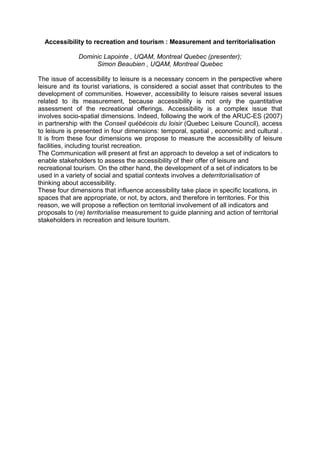
Accessibility to recreation and tourism : Measurement and territorialisation
- 1. Accessibility to recreation and tourism : Measurement and territorialisation Dominic Lapointe , UQAM, Montreal Quebec (presenter); Simon Beaubien , UQAM, Montreal Quebec The issue of accessibility to leisure is a necessary concern in the perspective where leisure and its tourist variations, is considered a social asset that contributes to the development of communities. However, accessibility to leisure raises several issues related to its measurement, because accessibility is not only the quantitative assessment of the recreational offerings. Accessibility is a complex issue that involves socio-spatial dimensions. Indeed, following the work of the ARUC-ES (2007) in partnership with the Conseil québécois du loisir (Quebec Leisure Council), access to leisure is presented in four dimensions: temporal, spatial , economic and cultural . It is from these four dimensions we propose to measure the accessibility of leisure facilities, including tourist recreation. The Communication will present at first an approach to develop a set of indicators to enable stakeholders to assess the accessibility of their offer of leisure and recreational tourism. On the other hand, the development of a set of indicators to be used in a variety of social and spatial contexts involves a deterritorialisation of thinking about accessibility. These four dimensions that influence accessibility take place in specific locations, in spaces that are appropriate, or not, by actors, and therefore in territories. For this reason, we will propose a reflection on territorial involvement of all indicators and proposals to (re) territorialise measurement to guide planning and action of territorial stakeholders in recreation and leisure tourism.
- 2. L’accessibilité aux loisirs-touristiques : mesure et territorialisation Dominic Lapointe, UQAM, Montréal Québec (présentateur); Simon Beaubien, UQAM, Montréal Québec La question de l’accessibilité aux loisirs est une préoccupation nécessaire dans la perspective où le loisir, et ses déclinaisons touristiques, est considéré comme un bien social qui contribue au développement des communautés. Toutefois, l’accessibilité aux loisirs pose plusieurs questions en lien avec sa mesure, car l’accessibilité aux loisirs ne se résume pas seulement à l’évaluation quantitative de l’offre de loisirs. L’accessibilité est une question plus complexe qui implique des dimensions socio-spatiales. En effet, suite aux travaux de l’ARUC-ES (2007) en partenariat avec la Conseil québécois du loisir, l’accessibilité aux loisirs est présentée sous 4 dimensions : temporelle, spatiale, économique et culturelle. C’est à partir de ces quatre dimensions que nous nous proposons de mesurer l’accessibilité aux loisirs, dont les loisirs touristiques. La communication présentera d’abord une démarche d’élaboration d’un ensemble d’indicateurs pour permettre aux intervenants de mesurer l’accessibilité de leur offre de loisirs et de loisirs touristiques. Par contre, l’élaboration d’un ensemble d’indicateurs utilisables dans une diversité de contextes sociaux et spatiaux implique une déterritorialisation de la réflexion sur l’accessibilité. Ces 4 dimensions qui conditionnent l’accessibilité prennent place dans des lieux précis, dans des espaces appropriés, ou non, par les acteurs, donc dans des territoires. Pour cette raison, nous proposerons une réflexion sur l’implication territoriale de l’ensemble d’indicateurs ainsi que des propositions de (re)territorialisation de la mesure pour guider la planification et l’action des intervenants territoriaux en loisirs et loisirs touristiques.
